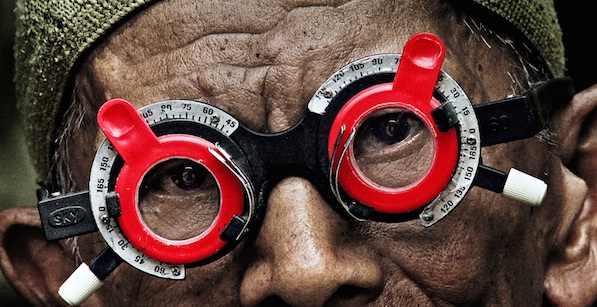
The following is a continuation of an ongoing conversation that began in Telluride and Austin regarding The Act of Killing and then on to Berlin and back to Austin (where this discussion was recorded) about The Look of Silence. Jonathan Marlow speaks with celebrated filmmaker Joshua Oppenheimer about his latest documentary—soon-to-be-released by Drafthouse Films—on the occasion of the Fandor debut of several films either directed, written and/or produced by Oppenheimer.
Jonathan Marlow: Given the circumstances, it was essential to have filmed The Look of Silence prior to the release of The Act of Killing. It is not safe for you to return to Indonesia. Yet, when there were individuals that went out and attacked The Act of Killing during its release, you never mentioned the other project. When we talked in Berlin, your comments made it clear why these two films operate separately and why they operate as a pair.
Joshua Oppenheimer: It is very difficult to answer an attack in the way that I had wanted. I would have liked to say, ‘I actually think these attacks are somewhat disingenuous.’ Let me put this differently. What I felt was that there were two main criticisms: ‘You are giving the perpetrators a platform and that is bad…’ because either you glorify them because they have a platform or else because we should not listen to the proposed justifications of perpetrators as if that was a kind of punishment for their actions. Then there was another sort of way of talking about this—the way Nick Fraser [in the Guardian] put it—it is like giving aging Nazis a platform to dramatize what they have done. You would never do that. I did answer the question again and again about, ‘Is it not giving them a platform?’ I said, ‘What is a platform? A platform is something you go up to, you speak, you say what you want to say and then, when you are finished, you step away from the platform.’ The perpetrators, from the outset, know all of their dramatizations are only being made for The Act of Killing. They know that they have no editorial control over these dramatizations. They know that the dramatization is a method to understand how they see themselves and how they want to be seen. So they do not have a platform because they have no control over what they’re saying from their soapbox. They do not have a soapbox on which to stand and say whatever they like. That is the first point. I said that many times throughout the release [of The Act of Killing]. Secondly, there is a claim that what I did glorifies the perpetrators, somehow. I answered that many times as well. I would say, again and again, that there has never been a single viewer who has seen The Act of Killing—none; not one—who has come away [from a screening] thinking that these people look glorious. I do not think that there is anyone who honestly felt, ‘He is trying to make them look glorious.’
The film is an exposé of a corrupt political system. I think it is also a film that has one of the least cathartic endings in cinema history. We see a man destroyed. Nick Fraser’s way of critiquing it—which I only mention because it was the most prominent, perhaps, because it came out in the Guardian, just before the Oscars—his claim was [to paraphrase], ‘It is like going to aging Nazis and asking them to dramatize their crimes.’ That idea was very beautifully addressed in the comments to his criticism. And then I wrote my own op‑ed about the film, not really in response but certainly in dialogue with some of those issues. I wrote, ‘No, this is precisely not a film about re-enacting crimes from fifty years ago. This is a film about impunity today. The difference between aging Nazis and the men in my film is that aging Nazis—he mentioned aging Nazis in Argentina hiding from justice—they’re fugitives, whereas the men in my film, when they die, will get full state funerals with full honors. My film is not what appeared as (perhaps on the surface to be) reenactments of past events. They are not. They’re dramatizations. The distinction is important. They are dramatizations of the present-day stories. They are fantasies and lies that the perpetrators tell so they can live with themselves and so they can threaten the whole society into not challenging their power (or challenging their narrative). Not only do they stand to lose power if their story is challenged but also—as Adi Zulkadry says, eloquently—in the middle of the film, they are forced to face their conscience. As Adi says regarding the government propaganda films celebrating the killings that Anwar is watching in the [‘uncut version’ of the] film, ‘Look, Anwar, we know this propaganda film is a lie. Everything it says is a lie,’ and Anwar’s response is, ‘Be that as it may, nevertheless, it may be a lie. But it is the one thing that makes me feel better about what I’ve done.’ There is a desperate clinging to lies that, in fact, we know are false.
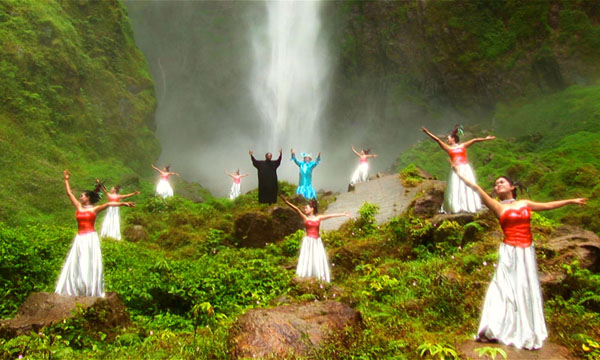
I think one of the most important findings of this work is that all our capacity for evil is rooted in self‑deception. A lot of the criticism was self‑deceiving, too. It was not honestly framed. And so all that I could do was point out the logical flaws that, to me, revealed that the criticism was not honestly framed and I would draw attention instead to what I think is important about the film. The Act of Killing does not need a second film to justify the dramatizations. If there were no second film, The Act of Killing would be (in my view) absolutely complete. The fact that there is a second film and that the two are a pair and they are part of a work that—as a whole, I hope—is greater than the sum of the parts may assuage some of the critics. But I think that it won’t assuage all of them. I think many of them will simply come up after seeing the second film and say, ‘I liked this much better than The Act of Killing.’ They won’t see the two films as part of a single thing. Because what they really don’t like about The Act of Killing is the very uncomfortable fundamental point of the film: every act of evil in our history has been committed by human beings like us. If we want to understand it, we had better be prepared to do the psychological work. It is the basis of how we human beings understand other human beings: empathy. That does not mean sympathy. That is painful because it involves looking at ourselves. And people do not want to do that in such an extremely painful context.
Marlow: At least in the U.S., there is an all too common pattern of contemporary critical assessment. ‘Sure, I, as a critic, get what the filmmaker is doing. But there are others out there that won’t understand and they could be persuaded to think that these are actions that should be celebrated.’ That, perhaps, is one of the most arrogant approaches of so-called criticism. ‘I am smart enough to make the distinction but there are others that are not.’ Something similar occurred in the midst of The Birth of a Nation anniversary. ‘You need to make a case for why it is necessary to show this film.’ The problem that we face consistently in this country is that when we are confronted with things that make us uncomfortable, we want to either ignore them or get rid of them. We certainly do not want to address them. We do not want to see them. We do not want to understand them. We do not want to accept that the people-we-believe-ourselves-to-be-now and the-people-we-were-not-that-long-ago are not particularly different.
Oppenheimer: I am opposed, instinctively, to erasing the past.
Marlow: I guess that is what I am getting at.
Oppenheimer: First of all, the problem with the critical stance that, ‘I know better than the audience,’ I think it betrays what really should be the fundamental spirit and purpose of film criticism: to describe—for a reader who has not seen the film or one who has seen it and wants to understand it better—the emotional experience of the film; to describe how the film works on an audience; to analyze the resonances of that experience within the political and social world in which we live; to understand how the film works and how the film is constructed to create that experience. If we start from the perspective, ‘I had this experience but the audience will have a different experience because they are less intelligent than me,’ then real criticism cannot happen. At best, the critic can speculate on what the experience for an audience will be. But that is not criticism. Criticism must help illuminate how an art form works. Otherwise, not only is it valueless, it is worse than valueless.
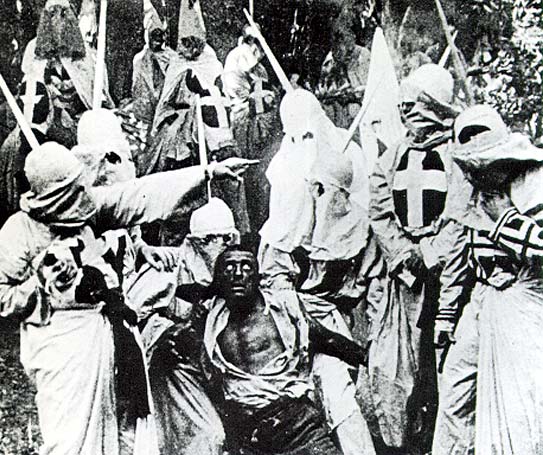
Marlow: It is destructive.
Oppenheimer: It is destructive. In terms of this really interesting question about The Birth of a Nation, The Look of Silence witnesses an attempt that fails through the individual scenes but perhaps succeeds, overall, through the work it is doing in Indonesia. That is another thing that upset me about some of the criticism of The Act of Killing. The simplest Google search—’Act of Killing in Indonesia’—would reveal the work the film was doing in Indonesia. People who were saying and writing and publishing that this was glorifying the perpetrators and claiming, ‘This is giving them a space they don’t deserve,’ were, I felt, deliberately not looking at the real impact of the film. The Act of Killing does not expose the crimes of the perpetrators—the fundamental point is that everybody already knows about the crimes but is too afraid to talk about them—but it exposes the mendacity of a lie. It is a national lie. It is not Anwar’s self‑glorification but rather the collapse of his personal lie. The film then witnesses and catalyzes the collapse of a national lie. There have been numerous other films created about 1965 in documentaries from the perspective of the survivors. They have no impact. That is not to say that they are not valuable. They are building a record of something that has happened that is being denied. This film is actually demolishing the lie.
Provided that the film is seen—and we have made great efforts to make sure that it is—in Indonesia, the follow‑up then enters the space with a vision for what might happen now that the lie has been destroyed. There is a possibility for a whole new discourse because the official discourse has been demolished. I felt that the admission of the failure on the part of people who would take the time, for example, to write a lengthy piece for the Guardian without simply doing any research about screenings of the film in Indonesia. What is the reaction in Indonesia? It was such an obvious thing to check. I felt that the criticism itself was somewhat disingenuous. It is not quite sincere. It is as much a cover for a discomfort that comes from having been asked to see yourself in the mirror of a man like Anwar Congo. For me, what can I say? Having spent five years filming with him and three years editing that material, having gone through years of nightmares and insomnia because of what I saw in that man and the men around him, I really thought about myself and about all of us. All I could do was offer that mirror to the public and those who want to look at it. Look in the mirror. I think that the majority of people who saw the film would see what they see. And those who want to look away will look away (and then create whatever story they wish to justify looking away). Those stories, of course, are not always sincere.
Marlow: Usually they are not.
Oppenheimer: They’re not. There are critics who would like to retain a position of mastery over the film (and the audience) instead of exploring the experience of being moved and transported by the film. Despite the talk about ‘people not knowing what to do with this film,’ as Errol Morris put it when that piece in the Guardian by Nick Fraser came out, he said, ‘Joshua, don’t worry. Look at the overwhelming number of people who have been deeply moved by the film. They are trying to grapple with it. Ninety-five percent of the reviews [were positive].’ I think that there is a small minority of critics who will try and retain a sense of mastery over the film they are watching, meaning that they cannot really do real criticism because they do not have enough humility to describe how they are moved. One of the things that has been beautiful for me are those people who, of course, are not likely to feel comfortable acknowledging their own vulnerability when they describe their experience of being confronted with this mirror. They are the ones who therefore invent an excuse for not looking in the mirror. It is often a self-righteous excuse. I have to say, even among the people who criticize the film, there is a preponderance of critics who come up to me who have virtually retracted what they said about The Act of Killing after having seen The Look of Silence. That also takes courage. I think that is very humble and it is beautiful and it is honest. That is the real spirit of criticism, allowing one experience and then allowing a different experience [that may be contradictory]. The other reason that I did not want to speak-out against those who were critical of The Act of Killing too much is that I make films that are intended to be an experience for viewers. If people have a bad experience, that is perfectly valid. It is their experience. What can I say? I can say, ‘I think you are not being honest about your experience.’ But it is their experience. What do I know? They are different from me. I have to recognize that.
Marlow: It is helpful, of course, that people are having any experience at all. Typically, a film about such a conflict would be a very didactic. ‘Here we are in 1965. Here is what occurred.’ Very straightforward. They do little more than serve as a textbook of, ‘This is what happened.’
Oppenheimer: I think that they primarily serve to reassure us that we are on the right side. Historical morality.
Marlow: You are absolutely right. The decision…
Oppenheimer: The record of all those films can do that. That serves a value. That was actually Nick Frazier’s good point buried in his article: we are a community of concern and we are a community that should collectively inscribe our values and say that this is wrong. That has some value. Maybe it does.
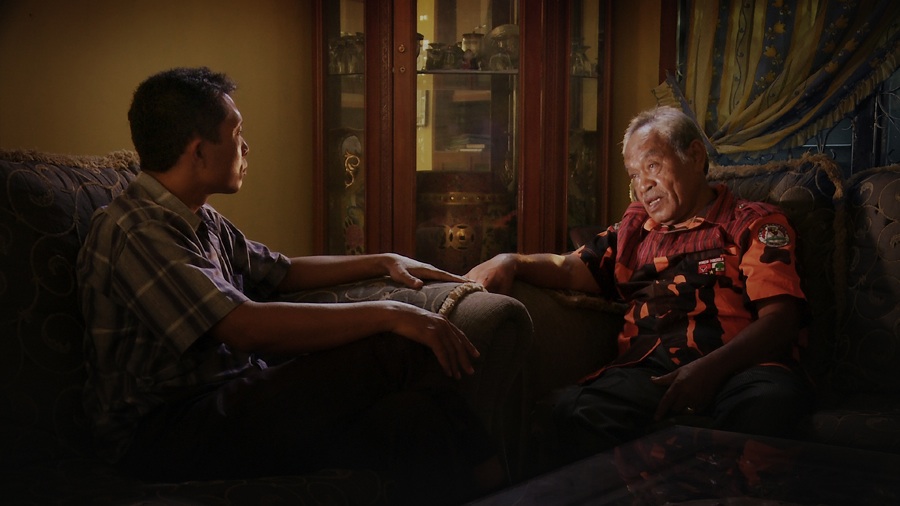
Marlow: Another issue of The Act of Killing and The Look of Silence is that your focus on the present allows an additional layer of discomfort for the viewer. I think maybe this is particularly sensitive in the United States because many of its citizens believe (despite plenty of evidence to the contrary) that the country is always proactive in righting wrongs. It is a myth that gets persistently perpetuated. An insufficient parallel, perhaps, to the situation in Indonesia is a parallel history where the National Socialist Party were still in power in Germany today…
Oppenheimer: …and that we might have supported it at the height of the atrocities.
Marlow: Some viewers cannot look in the mirror and say, ‘How is it that this was allowed to happen?’ They likely were not aware of the extent to which this is presently problem and little is being done about it. Nothing had been done about it on a national level.
Oppenheimer: One point I am able to make again and again with The Look of Silence regards this piece of archival footage from NBC News [in the 1970s] where it is reported to Americans that one of our large multi‑national corporations creates the rubber for the soles in our shoes and, above all, for the tires on our cars and bicycles. That this company is using slave labor to harvest its rubber and sending those slaves back to concentration camps from which they are being dispatched out to death squads to be killed or starved to death. This is precisely what German corporations did on the periphery of Auschwitz twenty years earlier. It is a profound challenge to our idea that we are a force for freedom and democracy in the post‑war world. We were replicating some of the most outrageous, horrific crimes at Auschwitz in the name of a free market. Slave labor is available and we will use it because it is available. We would be foolish not to! I am sure it was not a murderous intent on the part of Goodyear. It was purely an economic decision. Just as I am sure it was for the German corporations at Auschwitz. The fact that we were doing it twenty years after Auschwitz is really a profound stain on our country’s record. It is a very important moment for me in the film. Which screening did you attend at Telluride?
Marlow: The first. Tim League [of the Alamo Drafthouse and Drafthouse Films] was there.
Oppenheimer: At the third screening, there was a woman at Telluride who stood up and said, ‘My father was a Goodyear executive at that time. I never knew this. I’m not sure that he knew this.’ Perhaps he did not know it, depending on his role there. But I think that is very important to me. In the mention of erasing the past, I was also going to mention earlier that at my first screening here in Austin, a student came up to me afterwards and said, ‘On campus, there is a whole debate. There was a Jefferson Davis statue. We wanted to remove it. We got it removed but how do we have a dialogue with the other side, with the people who wanted to keep it?’ I started saying, ‘I think it is actually somehow important, ideally, to try and learn from Adi and have a discussion where you try and short circuit the instinctive expected mutual defensiveness and say, ‘Look, this is what this issue means to me. This is why it hurts me to have this statue here.’ And then listen to them about why they want to keep it. I am not sure that is strategically the right thing to do if it is more important to get rid of that statue.’ But I also then said, ‘You know something? I am not certain that it is a good idea to tear down those statues.’ This goes back to the question of The Birth of a Nation. I said, ‘For example, when I am asked what I feel should happen in the way of justice in Indonesia, I do not say that all of the monuments celebrating the genocide—of which there is one in every single town in Indonesia—I do not think that they should be torn down. I think, ideally, they would be turned into exhibits in a much large Indonesian holocaust museum that would mostly be composed of the remains of concentration camps and torture centers but would also include these monuments with a thorough explanation of how they functioned.’
Marlow: The moment in The Look of Silence that is from this broadcast also portrays the slave laborers—these prisoners—as the enemy of the powers-that-be. It is stated matter-of-factly. I remember them described as ‘communists,’ for that period something of a code for ‘different from us.’
Oppenheimer: Actually—sadly—they do not even say they’re communist. They say…
Marlow: My faulty memory…
Oppenheimer: No. It is worse. All they say is that they were members of the Rubber Workers Union (which was communist-run). They’re members of a ‘communist-run union.’ Meaning they are guilty-by-association and they deserved to be used as slaves. They’re plantation workers and so we should not hesitate to conclude that somehow they’re dyed-in-the-wool communists.
Marlow: But even if they were, why would that even be an issue?
Oppenheimer: It says something about that time. That we can hear they’re members of a communist-run union and the public menace is so enormous that they should be put to death or exploited and worked-to-death as slaves.
Marlow: It is clearly not an incidental reference. They are making the connection so that the viewer will not feel that what is happening…
Oppenheimer: …is wrong.
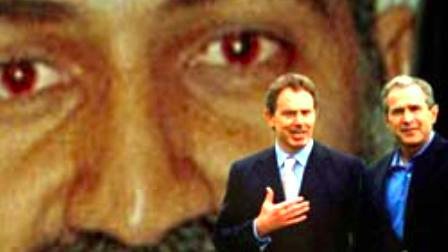
Marlow: Even now, seeing the way that it is presented is horrific. It reminds me of much of the news footage that Adam Curtis uses in his work. That even something long ago is presented plainly—even as dramatized in The Birth of a Nation—can be equally horrific. We are surrounded by it.
Oppenheimer: We are surrounded by it. There is a terrible ahistorical blindness that leads us to interpret the world into ‘good guys’ and ‘bad guys’ again and again and again. What we are seeing right now with Ukraine. I think the best American author—the simplest, most accessible American author for cutting through this—is actually, at the moment, Stephen Kinzer. He is a columnist at the Boston Globe who has written such books as Overthrow, a kind of survey of every time the United States has overthrown a foreign government; All the Shah’s Men, an account of the coup in Iran against Mossadegh, the CIA coup; The Brothers, about the Dulles brothers. I think Overthrow is quite accessible and magisterial. He wrote a really great column recently about how we can understand what we are doing in the Ukraine and how we can understand what Putin is doing there. He says, ‘Look. Putin is responding exactly as he should if you imagine, and as we should expect, certainly, if you imagine the Russians started to put bases in Vancouver and in Chihuahua. Would America react? Of course.’ This is not to say that Putin is a good man but to say, ‘Let’s get away from looking at who is a good guy and who is a bad guy. Let’s look at how things work.’ This is also exactly Adam Curtis’ point [in Bitter Lake]. There has been a wholesale shift towards ahistoricism that really started with [Ronald] Reagan and [Margaret] Thatcher. Where we stopped looking at political problems as ‘political’ and we start seeing them as ‘moral.’ The consequences of that is a complete blindness to how the world really works and, therefore, a devastating folly in which we are riding our imaginary white horse with our imaginary white hat shooting at phantom enemies right towards the edge of the cliff.
Marlow: The problem with Islamic State is not… I don’t want to say…
Oppenheimer: As Mark Danner said, ‘they’re ours’ in the sense that they were formed in our prisons. They were a predictable consequence of our policy in Iraq.
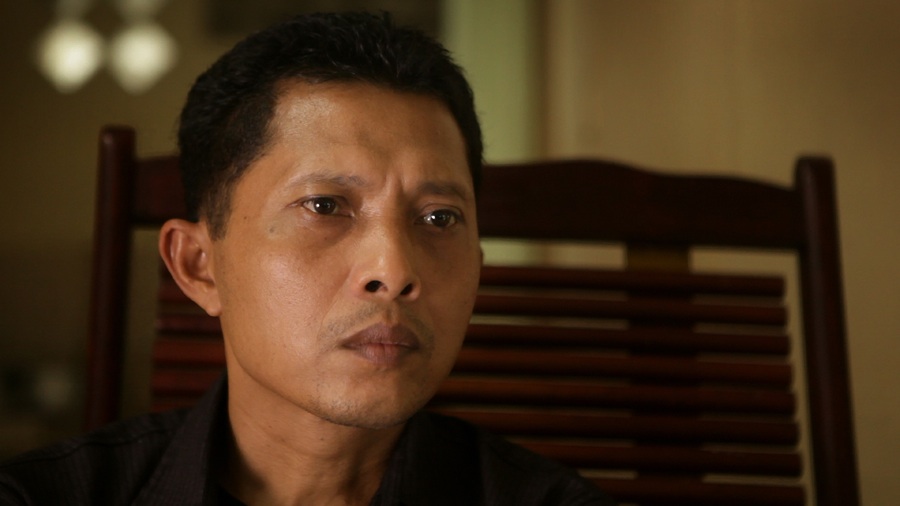
Marlow: But we have been here before and we continue to be there. We say that we learn from our mistakes. We don’t learn from our mistakes. We repeat them, endlessly.
Oppenheimer: That is also what Mark Danner said. He describes it as ‘frozen scandal.’ Because, he says for example, we don’t do anything about the fact that our country had an official policy of actual torture and even because it was a little bit contentious across much of the political spectrum—the celebration of torture—because that persists and because we don’t do anything about the torture revelations when they’re exposed, it is easier to pretend to ourselves that we don’t know about torture. So the same things keep getting revealed again and again and again and again. We wring our hands every time in shock. We believe it is real shock. Just like Anwar feels really good when he watches a government propaganda film over and over again yet he knows it is a lie.
Marlow: Because it reconfirms the lies that you are telling yourself.
Oppenheimer: Again, it all goes back to my basic point that the key insight for making The Act of Killing. I think you see it in The Look of Silence, too. You certainly see it [spoiler] in the final scene where Adi is confronting the widow and the two sons who know what has happened but are pretending that they don’t. Our capacity for evil depends on self-deception. We should be vigilant about self‑deception. Maybe that is part of what I was saying about some of the criticism around The Act of Killing. It was well-intentioned self-deception.
Marlow: Exactly. In an entirely different direction, how do you feel about Kazuo Hara‘s The Emperor’s Naked Army Marches On?
Oppenheimer: I love that film. Kazuo Hara spoke not long ago in Tokyo. My husband is Japanese and he was sent this information by a friend. I spoke to Hara in Japan; I met him and did a dialogue with him at the Yamagata Film Festival. Then, when The Act of Killing ‘director’s cut’ came out, the distributor—because they knew I love Hara’s film, maybe it was an anniversary for the film, too—did one special day which included talks and panels and a double-bill of The Act of Killing ‘director’s cut’ and Kazuo Hara’s The Emperor’s Naked Army Marches On. Hara stood up and said, ‘I met with Michael Moore and he’s a typical American idiot. I then met with Joshua Oppenheimer and he’s also a typical American idiot.’ That was what he said about me.
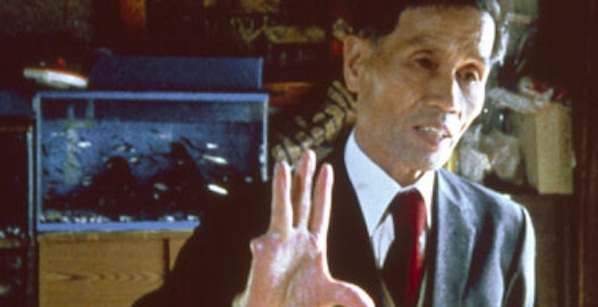
Marlow: I had no idea.
Oppenheimer: But I want to compliment Kazuo Hara. I am mature. I think The Emperor’s Naked Army Marches On is a remarkable film. I have not been asked about it since I read his comments about me. Maybe I will now be a little more honest about my feelings about it, too, since he called me an idiot. I won’t call him an idiot! But I will say I do not think that I could have done what he did. People will see me going to great lengths, creating situations where things really spiral out of control. People find themselves beyond their safety zone—or beyond their comfort zone—and things spiral out of control. To the very best of my ability, I always try to keep all of that within the safe space of making a film. People who see the attack on the village [in The Act of Killing] think, ‘You’re re‑traumatizing children and family members.’ No. It is a film set. All of the people—victims and children in that scene—are not only the immediate family members of the perpetrators and paramilitary members acting as perpetrators in the scene but none of the children have been told what the scene is about, deliberately. They’ve been carefully protected from that. All of the children who are crying are auditioned for their ability to cry in simple improvisational scenes about things that are happening on the playground at school. The ones that could cry are put in front of the camera. Similarly, how can you go and extort these people? You become an accomplice to this extortion. I realized that was when my crew said, ‘You must film this!’ because that was happening in every market across Indonesia every day. I thought to myself, ‘Okay, what I will do is I will then ask Hermain and Safi to go fifty meters ahead while I claim to be getting a release form signed. But really what I will do is explain why I am there and I will pay everybody back.’ Simply, so that they do not come away from that encounter feeling more afraid than they normally would. Now, suddenly, the perpetrators—the thugs—have their own film crew. They can do this with impunity on television. At least they know our intention for being there is to expose this injustice. That is not a perfect solution because while they are being extorted perhaps they are more afraid. But it was the best balance I could strike between the responsibility of showing this. As my crew said, ‘This is happening every day and no one has ever filmed it. You must film it!’ and not wanting to do harm. I’m always trying to do whatever I can. The fact that we could film all six of those confrontations in The Look of Silence and no one is arrested. No one is hurt. Everybody gets out of there safely. Even the most threatening of the perpetrators, by the time we left and packed up our equipment, we are all shaking hands. There is at least a kind of detente. That is something I am proud of. And I think if you asked me would I sit there and film while someone is being beaten up as Kazuo Hara does in The Emperor’s Naked Army? No, I would not do that. I would not allow that to happen because I would feel responsible. I do not believe that I am documenting a pre‑existing reality. I believe whatever is happening is happening for the camera. I have been giving this example of a mother… If you can go and talk to your mother about something very, very painful and you are alone and you are really talking about something that you have wanted to discuss or something you have wanted to confront her about or ask her about your whole life but you haven’t had the courage to do so—and now you do—imagine that. Now imagine the same thing but a camera is filming you. You cannot. No matter how long you’ve been filmed by that crew, you cannot confuse those two situations because you never



